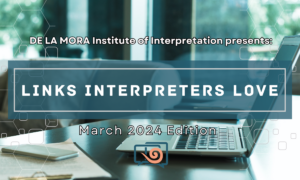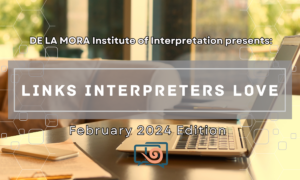By Agustin De La Mora
One of the most important tools a successful interpreter has is the ability to make an objective self-assessment of their own performance. Skilled professionals in many different careers do this by either proofreading their work, asking for feedback on newly released products or continually providing free upgrades to existing software based on customer behaviors. However, working interpreters are often at a loss when striving to improve on their skills as a result of the obvious nature of the job:
When an interpreter is providing language access, by definition, they are the only person in the room that has the ability to realistically assess their performance.
If the individual with Limited English Proficiency (LEP) were to speak enough English to say to the interpreter “Hey! Your interpretation of my statement into English doesn’t match what I said in my native language”, then the interpreter would not be needed in the first place. Interpreters essentially only work in environments where they are completely unmonitored, where no one present can say “Stop! You’re making a mistake!” This reality is part of the appeal of this career since it makes the interpreter completely autonomous but with that freedom comes an enormous responsibility. Without self assessment methods working interpreters could be practicing and reinforcing big mistakes. This often leads to unpleasant surprises when being evaluated by outside parties or worse lead to very real legal implications.
As an educator and as an experienced interpreter I often encounter the following example:
An interpreter works for 5 years as a freelancer for a local Judicial Circuit. They learn the ins and outs of appearing in court, how to address the courtroom personnel in English properly, and how to project a professional and courteous demeanor while performing their duties. To the judge and other people in the courtroom this individual appears to be a competent and experienced interpreter. To the LEP individual this person appears to appropriately interpret their words into English and vice-versa. But the ultimate truth is the Judge can’t know if the interpretation is correct. The LEP can’t know if the interpreter is skipping important information during their renditions because of unfamiliarity of regional slang and sayings. Not to mention a lawyer’s argument in a case can hinge on a single word or phrase like “intentionally”, “willfully caused bodily injury”, “knowingly fraudulent” and so on. Because without self evaluation, self improvement and the discipline to study, these egregious mistakes are continually practiced and reinforced. Next the interpreter believes they have a solid 5 years of experience and as regulations change they are asked to take the certification exam. The interpreter is confident to take the exam but years of unknowingly using false cognates, evident gaps in vocabulary, and usage of inappropriate words brings about poor and failing results. Immediately their though process turns outward to blame the exam as biased against speakers from certain countries, regions or the very accuracy of the test itself.
Unfortunately for our hypothetical court interpreter, none of their thoughts are true. The Nationally recognized certification programs for court and medical interpreters rely on carefully researched and field-tested exams that have withstood many challenges, revisions and have in every case been demonstrated to be objective, effective and reliable.
The example above is not entirely based on fictitious characters. To avoid this type of rude awakening down the road, interpreters should learn to assess themselves objectively as early as possible, and continue doing it constantly to monitor their progress and avoid complacency and bad habits.
An easy way to start to break the cycle is ‘shadowing’

Why Shadowing?
Shadowing helps build confidence, smooth delivery skills, and multi-tasking abilities. More importantly, shadowing helps any person, even someone who is just beginning to learn about interpretation, become familiar and comfortable with the idea of objective self-assessment.
How to conduct a proper shadowing exercise:
1. Find a written 250 word document like a newspaper article in English. Try not to read it, any article will do- simply pick one and print it out.
2. Record a native English speaker reading said article.
3. When you are ready to conduct the exercise place the ‘script’ or article facing down in front of you and play the recording.
4. Simply listen to the recording and wait a few seconds after the speaker starts (this is called Ear-Voice Span, or EVS). Record yourself repeating everything the speaker says, word for word in English -once again without reading or looking at the script.
5. Listen to your recording and compare it to the original by utilizing the script. Highlight any omitted words, paragraphs or paraphrasing you might have done.
The highlights and mistakes you find will tell you a lot about your current ability as an interpreter. Remember, if you can’t repeat everything you hear in English, how will you be able to render everything you hear accurately into another language?
Knowing that practice tools are of essence for the lifetime of every interpreter, we at DE LA MORA Interpreter Training have created the Virtual Language Labs. They are downloadable practice material that challenges the interpreter in every mode: consecutive, sight and simultaneous. Each downloadable contains professional recordings and scripts developed from real court proceedings with instructions on how to objectively test your skills and tips on how to improve renditions. We are releasing new versions monthly and right now a Spanish version is available for purchase. At a price point of only $25, anyone can afford to improve their skills and that was ultimately our mission.
It is up to the interpreter to objectively test their skill level, since perfection is illusive everyone has room for improvement. The Virtual Labs were made from that knowledge and from my own experience. And of course if you do purchase- We would love your feedback.
-Agustin De La Mora
President and CEO of DE LA MORA Interpreter Training
Visit the online store on our website to purchase The Virtual Labs:












Leave a Reply